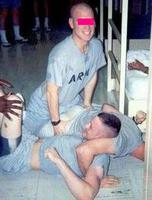Don't Ask, Don't Tell...We Already Know

It used to be easy to dodge the draft. In the past all you had to do was flee to our neighbors up north, register for classes, continuously lose your reading glasses, or a toe, or maybe two.
So by the early nineties, as a skinny and scared young boy, I had already planned my exit strategy. Certainly I could learn to like faux-French food, and re-pronounce my abouts "aboots." And surely I could handle an extra semester of homework, perhaps even two if the war dragged on longer than expected. And so what if not all my little piggies made it back from the market? I'd still have my most important appendage -- and boy does it enjoy wee-wee-weeing in the safety of my own home.
I was sixteen when I first heard the term "Don't Ask Don't Tell" being thrown around on television. Though established almost two years earlier, it wasn't a policy issue often discussed at the dinner table. I had read what I could on the topic, realizing at last that I no longer needed to flee the fight. I could finally just be me. I could tell the world what I liked, and stand the inevitable rejection from both my friends and my family, so long as the U.S. Military joined in on the fag-bashing festivities.
And so for the past ten years I have watched and waited, counting the rising number of soldiers discharged from service for being, or claiming to be gay. At last count, according to statistics provided by the ServiceMembers Legal Defense Network -- a non profit organization dedicated to ending discrimination faced by gay and lesbian military personnel -- as of 2003, over 9,672 men and women have been discharged simply based on the "discovery" of their sexual orientation.
The official rule on the issue dictated in The Pentagon's New Policy Guidelines on Homosexuals in the Military states, "The military will discharge members who engage in homosexual conduct, which is defined as a homosexual act, a statement that the member is homosexual or bisexual, or a marriage or attempted marriage to someone of the same gender."
But all that's about to change. You see, the Powers-At-Be have slowly caught on that the use of sexual orientation to avoid deployment is resulting in a sharp decline in available combat forces. In fact, with dwindling world-wide support for the current war in Iraq, and as more countries continuously pull out their troops from the front lines, the military here, it seems, has chosen to retain it's openly gay soldiers, at least until the war has been won.
The Center for the Study of Sexual Minorities in the Military, a CA-based research unit which tracks the history and inner workings of sexual minorities in the armed forces, began looking into suspicions that fewer gay men and women were being ousted from the line of fire, particularly over the past three years. Their findings resulted in the discovery of a loophole regulation currently in use by the military which claims an openly gay service member will be forced into active duty, despite the current Don't Ask policy, when his or her unit has received notification of alert status.
If you ask anyone involved with combat operations overseas these days, we are in constant receipt of these status alert notifications.
Perhaps it's the Pentagon's coy way of admitting gays and lesbians don't actually threaten the cohesion of a military unit, the excuse they often use to legitimize their discriminatory policy -- the same logic, you'll remember, once presented when women were first introduced into the picture. Then again, it may just be an act of deployment desperation.
Regardless of the intention, the military insists the Don't Ask Don't Tell ban remains in full effect. According to recent reports, if a soldier reveals his orientation while serving in active duty, the "issue" of his discharge will be postponed until his return from war, once the unit can be properly demobilized.
Apparently after they've served their purpose, after they've risked their very lives, put their frail faith for a future in the hands of a government too scared to send their own, gay men and women of today's U.S. Military can be guaranteed, upon arrival home, the same discrimination and disgraceful dejection thousands have faced before them. The Land of the Free and the Home of the Brave, so long as you're a straight white male, will make sure of just that.
Suddenly, being called a Canook is quite the compliment, eh?



0 Comments:
Post a Comment
<< Home